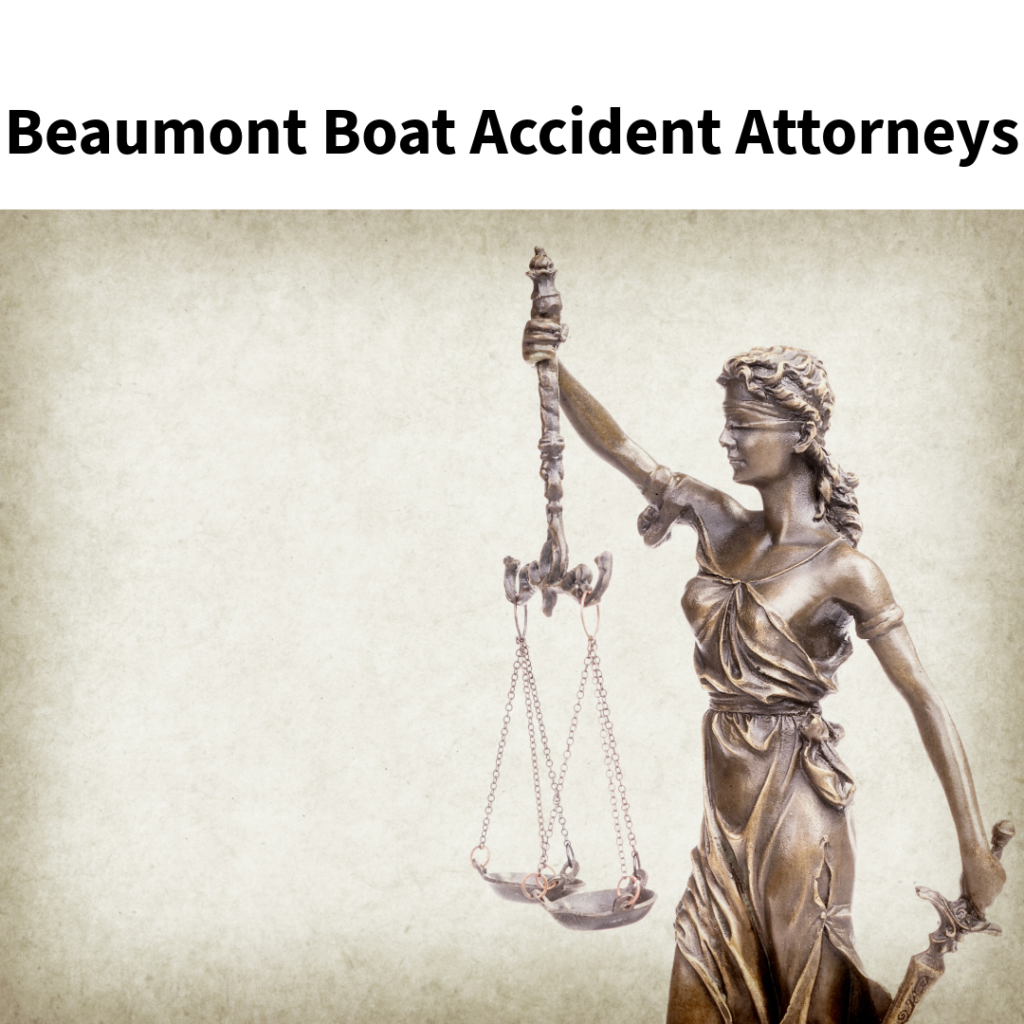Beaumont Boat Accident Attorneys : Beaumont Boat Accident Attorneys specialize in maritime law, offering unparalleled expertise in navigating the complexities of boat accident cases. Our dedicated team conducts thorough investigations, leaving no detail overlooked. With a proven track record of success, we negotiate assertively to secure favorable settlements for our clients. We prioritize a client-centric approach, providing compassionate support and transparent communication throughout the legal process. Choosing Beaumont Boat Accident Attorneys means choosing a committed partner to safeguard your rights and secure the compensation you deserve.
While reading this article if you have any questions regarding Beaumont Boat Accident Attorneys, please comment on the comment section below.

Brief Overview of Beaumont Boat Accident Attorneys
Maritime accidents encompass incidents that occur on navigable waters, posing unique challenges within the legal landscape. These accidents involve vessels like boats and ships and may result in injuries, property damage, or environmental harm. Maritime law governs these cases, requiring specialized knowledge to navigate the complexities. Swift and comprehensive investigations are crucial in establishing liability and pursuing compensation. Legal professionals with expertise in maritime law, such as the Beaumont Boat Accident Attorneys, play a pivotal role in ensuring the protection of rights and just outcomes for those affected by maritime accidents
Understanding the Importance of Legal Assistance in Boat Accident Cases
Boat accidents can be traumatic experiences, leaving victims grappling with physical injuries, emotional distress, and financial burdens. In the aftermath of such incidents, the importance of seeking legal assistance cannot be overstated.
Expertise in Maritime Law
Maritime law is a complex field, and boat accidents often involve intricate legal nuances. Having seasoned attorneys, like the Beaumont Boat Accident Attorneys, with expertise in maritime law can make a substantial difference. They possess a comprehensive understanding of the legal frameworks governing such cases, ensuring that every aspect is meticulously addressed.
Thorough Investigation and Evidence Gathering
Swift and thorough investigations are pivotal in establishing liability and building a robust case. Legal professionals specializing in boat accidents bring invaluable skills to the table. They delve into the details of the accident, examining the scene, scrutinizing documents, and gathering evidence that strengthens your position. This meticulous approach significantly enhances the chances of a favorable outcome.
Effective Negotiation for Maximum Compensation
Navigating negotiations with insurance companies and opposing parties demands a strategic and assertive approach. Skilled attorneys, adept in the art of negotiation, can secure favorable settlements. The Beaumont Boat Accident Attorneys excel in negotiating on behalf of their clients, ensuring that they receive the compensation they rightfully deserve. This includes coverage for medical expenses, lost wages, property damage, and emotional distress.
Proven Track Record and Success Stories
Choosing legal representation with a proven track record is a strategic move. The Beaumont Boat Accident Attorneys boast a history of success, having successfully handled a myriad of boat accident cases. Their achievements reflect their commitment to delivering positive outcomes for their clients, instilling confidence in those seeking legal assistance.
Client-Centric Approach: Compassion in Legal Representation
Boat accidents not only cause physical harm but also emotional distress. Legal professionals who adopt a client-centric approach provide not just legal expertise but also emotional support. The Beaumont Boat Accident Attorneys prioritize the well-being of their clients, recognizing the human aspect of each case. This compassionate approach fosters trust and ensures that clients feel supported throughout the legal process.
Legal Framework for Boat Accidents
A. Maritime Law Basics
Maritime law forms the bedrock of regulations governing boat accidents, providing a comprehensive framework for legal proceedings in navigable waters. This specialized branch of law encompasses a broad spectrum, including collisions, injuries, and property damage involving vessels. Key principles include the Jones Act, which protects maritime workers, and the Limitation of Liability Act, influencing compensation limits for shipowners. Navigating these complexities requires adept legal counsel, such as the Beaumont Boat Accident Attorneys, who possess a nuanced understanding of maritime law fundamentals.
B. State and Federal Regulations Applicable in Beaumont
In addition to maritime law, boat accidents in Beaumont are subject to both state and federal regulations. The Texas Parks and Wildlife Department outlines rules governing recreational boating, covering aspects such as watercraft operation, safety equipment, and licensing requirements. Federal agencies like the Coast Guard enforce regulations on commercial vessels, ensuring compliance with safety standards. The intersection of these regulations demands meticulous legal navigation. The Beaumont Boat Accident Attorneys excel in interpreting and applying these rules, ensuring comprehensive representation for their clients within the local legal landscape.
Identifying Responsible Parties
A. Boat Owners and Operators
Determining responsibility in the aftermath of a boat accident is pivotal for securing rightful compensation. Boat owners and operators play a crucial role in this process. Boat owners are typically responsible for ensuring the vessel’s seaworthiness and compliance with safety regulations. Negligence in maintenance or adherence to safety standards can render them liable for accidents. Operators, on the other hand, may be accountable for errors in navigation or failure to adhere to boating regulations.
Engaging the expertise of a boat accident attorney, such as the Beaumont Boat Accident Attorneys, is instrumental in identifying and holding these parties accountable. Their nuanced understanding of maritime law facilitates a thorough investigation, establishing liability for a favorable legal outcome.
B. Potential Liability of Manufacturers and Maintenance Providers
In some instances, the root cause of a boat accident may lie in defects related to manufacturing or inadequate maintenance. Manufacturers and maintenance providers can potentially share liability for the damages incurred.
Manufacturers may be held accountable for design flaws or defects that contribute to accidents. Maintenance providers, responsible for ensuring the ongoing safety of the vessel, can be liable if their negligence or substandard practices contribute to the incident.
Determining the involvement of manufacturers and maintenance providers requires a meticulous examination of the facts surrounding the accident. The Beaumont Boat Accident Attorneys excel in conducting detailed investigations, leveraging their expertise to establish the liability of these entities. Holding all responsible parties accountable ensures comprehensive compensation for victims.
Advancements in Boat Safety Technology
Technological innovations in boat safety have undergone remarkable advancements, reshaping the maritime landscape and enhancing the safety of vessels and their occupants.
1. Collision Avoidance Systems:
- Cutting-edge collision avoidance systems utilize radar, sonar, and GPS technologies to detect obstacles and other vessels. These systems provide real-time alerts, enabling operators to navigate safely and prevent collisions, particularly in challenging conditions or low visibility.
2. Automated Emergency Response Systems:
- Advanced emergency response systems employ sensors to detect emergencies such as fire, flooding, or equipment failure. Once identified, these systems can automatically initiate safety protocols, including deploying life-saving equipment and alerting authorities.
3. Enhanced Navigation Systems:
- Modern navigation systems integrate GPS, augmented reality, and artificial intelligence, offering precise and intuitive guidance. These systems contribute to improved route planning, obstacle detection, and real-time weather updates, ensuring safer journeys.
4. Predictive Maintenance Technologies:
- Predictive maintenance technologies utilize data analytics and sensor networks to monitor the condition of critical components on a boat. By predicting potential failures before they occur, these systems help prevent accidents caused by equipment malfunctions, enhancing overall safety.
5. Life-Saving Wearables:
- Wearable technologies, such as smart life jackets and personal locator beacons, have evolved significantly. These devices incorporate GPS tracking, water-activated signaling, and communication functionalities, enhancing the chances of swift rescue in case of emergencies.
6. Remote Monitoring and Control:
- Remote monitoring and control systems enable operators to assess the status of their vessel remotely. From engine performance to security monitoring, these technologies enhance situational awareness, allowing for timely responses to potential safety threats.
7. Improved Communication Systems:
- Communication at sea has seen substantial improvements with the advent of satellite communication and high-frequency radios. Enhanced connectivity ensures reliable communication between vessels, with shoreside authorities, and enables swift coordination during emergencies.

Advocacy for Stricter Regulations and Enforcement
1. Maritime Safety Imperatives:
- Advocacy for stricter regulations and enhanced enforcement in the maritime industry is grounded in the imperative of ensuring safety at sea. The unpredictable nature of maritime activities necessitates robust frameworks to mitigate risks, protect lives, and safeguard the environment. Stricter regulations set clear standards, guiding operators towards responsible practices that prioritize safety above all.
2. Prevention of Accidents and Environmental Harm:
- Stricter regulations act as a preemptive measure, aiming to prevent accidents and the resulting environmental harm. The maritime domain, often characterized by its vastness and unique challenges, requires comprehensive rules to address potential hazards, ranging from collision prevention to pollution control. Advocates argue that stringent regulations serve as a proactive strategy, averting disasters before they unfold.
3. Accountability and Deterrence:
- Advocates emphasize that strict regulations enhance accountability and act as a deterrent against negligence and non-compliance. Clear guidelines create a framework where individuals and organizations are held responsible for their actions. The fear of legal consequences and penalties encourages adherence to safety protocols, fostering a culture of responsibility within the maritime community.
4. Protection of Maritime Ecosystems:
- The oceans and waterways are delicate ecosystems, susceptible to damage from maritime activities. Advocacy for stricter regulations aligns with the broader goal of preserving these ecosystems. Enforced regulations set limits on emissions, discharge, and other potentially harmful practices, safeguarding marine life and the ecological balance that sustains the health of our oceans.
5. Industry Reputation and Credibility:
- A regulated and responsibly managed maritime industry enhances its reputation and credibility on a global scale. Advocates argue that adherence to strict standards not only protects lives and the environment but also bolsters the industry’s standing. A well-regulated sector attracts investment, fosters international cooperation, and demonstrates a commitment to responsible maritime practices.
6. Technological Innovation Integration:
- Stricter regulations often drive innovation in maritime technology. Advocates contend that the push for compliance fosters the development and integration of cutting-edge solutions. From advanced navigation systems to environmentally friendly propulsion technologies, these innovations not only enhance safety but also position the industry at the forefront of technological progress.
7. International Collaboration:
- Advocacy for stricter regulations transcends national boundaries, encouraging international collaboration. A harmonized global approach ensures consistency and effectiveness in addressing maritime challenges. Stricter regulations, when universally adopted and enforced, create a shared responsibility towards the safety of seas, benefiting all nations engaged in maritime activities.
FAQs (Frequently Asked Questions)
Q1: Why are stricter regulations necessary in the maritime industry?
Stricter regulations in the maritime industry are crucial for ensuring safety, preventing accidents, and protecting the environment. The vast and unpredictable nature of the maritime domain requires clear standards to mitigate risks, foster accountability, and promote responsible practices.
Q2: How do stricter regulations benefit the industry?
Stricter regulations benefit the maritime industry by enhancing its reputation, credibility, and global standing. Compliance fosters innovation, attracts investment, and encourages international collaboration. Ultimately, it creates a safer, more sustainable, and technologically advanced industry.
Q3: How can technology integration be encouraged through regulations?
Regulations can encourage technology integration by setting standards that push for innovation. Compliance requirements often drive the development and adoption of advanced technologies, from safety systems to environmentally friendly solutions.
Q4: What role does international collaboration play in maritime regulations?
International collaboration is essential for creating consistent and effective maritime regulations. A harmonized global approach ensures that standards are universally adopted, promoting cooperation among nations to address common challenges and safeguard the oceans.
Conclusion :
In conclusion, advocating for stricter regulations and enforcement in the maritime industry is rooted in the fundamental principles of safety, accountability, and environmental protection. The imperative to prevent accidents, preserve ecosystems, and foster responsible practices drives this advocacy. Stricter regulations not only mitigate risks but also elevate the industry’s reputation, encourage technological innovation, and facilitate international cooperation. As we navigate the dynamic waters of maritime activities, a commitment to stringent standards paves the way for a safer, more sustainable, and resilient maritime future.
Also Read :
Top 10 Pulmonology Hospitals in UK : Breathing Breakthroughs 2024
Best Cardiac surgery Hospitals In USA : Healing Hearts, Changing Lives 2024









